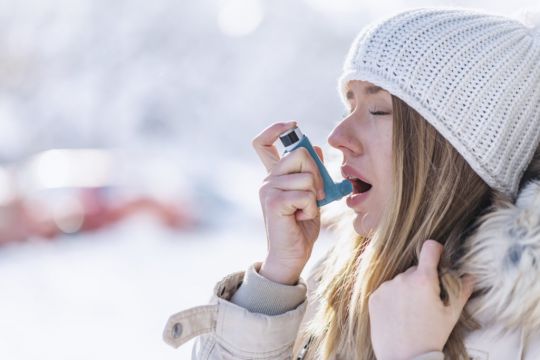Have you noticed that the sudden drop in temperature has made your asthma symptoms worse?
It’s believed around 5.5 million people in Ireland and the UK are currently receiving treatment for asthma, and the charity Asthma UK (asthma.org.uk) says it’s not uncommon for asthma symptoms to get worse over the festive season.
Looking after your respiratory health is important at any time of the year – and especially so this winter, with the ongoing spread of Covid-19 to factor in too.
Why does asthma get worse in winter?
Asthma can be harder to control during winter months for a few reasons. Ruth Morrow, a respiratory nurse specialist from the Asthma Society of Ireland (asthma.ie) says people often find their unwelcome asthma symptoms flaring up at this time of year, because there are more triggers lurking around.
“Changes to the temperature and cold air are a very common trigger for people with asthma and they can affect the airways, causing them to narrow,” says Morrow.

Then there’s all those cold and flu viruses going around. A cold or respiratory tract infection can exacerbate symptoms for people with asthma.
“Both of these triggers can irritate and inflame the airways, increasing the risk of someone with asthma having a potentially life-threatening asthma attack,” says Jessica Kirby, head of health advice at Asthma UK and British Lung Foundation (blf.org.uk).
How can I relieve asthma symptoms this winter?
There are a few things people with asthma can do to keep themselves as healthy as possible through winter.
1. Manage your asthma properly
“To do this, you should take your medication as prescribed, carry your reliever inhaler with you at all times and ensure you know how to use them correctly,” Morrow says.
“If you’re using your reliever inhaler more than twice a week, please speak to your healthcare professional as this may be an indication that your condition is not controlled and you may be at risk of an asthma attack,” she stresses.
2. Dress for the chilly weather
There are easy ways you can alleviate cold air from triggering your asthma too. This includes dressing appropriately for the season and keeping warm, especially when you go outside.

“Wrap a scarf around your nose and mouth, as this will both heat and humidify the air, making breathing easier,” Morrow advises.
3. Crank up the heating
Keep your house warm too. “It’s important to stay warm during the winter months, but make sure your home is well ventilated. If wind and rain trigger your respiratory condition, keep windows closed on particularly bad days,” Morrow adds.
4. Take your workouts indoors
If you’re an outdoor runner, it might be a good idea to bring your workouts indoors and take a few mat-based, cross-training classes instead. “Exercising in your house is a great way of improving lung function while also staying warm,” says Morrow.
5. Check the weather forecast
“Try to limit trips outside during particularly cold, wet and windy weather, which might make breathing more difficult,” notes Morrow.
6. Breathe in through your nose
This one is tricky to master, but can make all the difference. “Try to breathe in through your nose as much as possible, instead of through your mouth,” says Morrow. “This will help to heat the air before it reaches your lungs.”
7. Get the flu and pneumococcal vaccination
Flu may be common but it can be very serious for those living with a lung condition. “Pneumococcal disease is a major cause of illness and death in the UK and Ireland, particularly among the very young, the elderly and those with a weakened immune system,” warns Morrow.
Should people be even more cautious about asthma this winter?
There isn’t any evidence to suggest that having asthma makes you more likely to catch Covid-19, says Kirby, but like any respiratory virus, people with severe asthma or asthma that is not well controlled may be at higher risk of becoming seriously unwell if they do catch it.
“It’s therefore especially important that, with both flu and Covid-19 in circulation together, people with asthma take extra precautions this winter to stay well and reduce the risk of needing emergency care,” Kirby adds.
“Following social distancing guidance, as well as washing your hands regularly and wearing a face covering when appropriate will reduce the risk of you catching Covid-19.”
If you smoke, you are more at risk too. “Smokers are five times more likely to get flu and twice as likely to get pneumonia,” Kirby stresses. “Stopping smoking will not only lower your risk from Covid-19 but will make your breathing easier within days of quitting. ”
When should you see a doctor about your asthma?
If you are using your reliever inhaler more than twice a week, or you have more asthma symptoms than usual, then our experts say you should make an appointment with your GP. However, if you might be having an asthma attack, don’t wait for an appointment – seek urgent advice and care.
“If you suspect that you are having an asthma attack, immediate action should be taken,” says Morrow. “If your asthma is getting worse, it usually happens gradually over a few days, but can sometimes come out of the blue.
“Signs that your asthma is getting worse include coughing, wheezing, shortness of breath, chest tightness, feeling too breathless to talk, walk, sleep or eat, your lips turning blue and waking up during the night or earlier in the morning,” Morrow adds.
If you do notice any of these signs that your asthma is getting worse, don’t ignore them – it’s really important to see medical advice so you can make sure you have an action plan in place.
More information about managing your asthma during the winter months can be found on the Asthma Society’s Winter Wellness Guide (asthma.ie).







